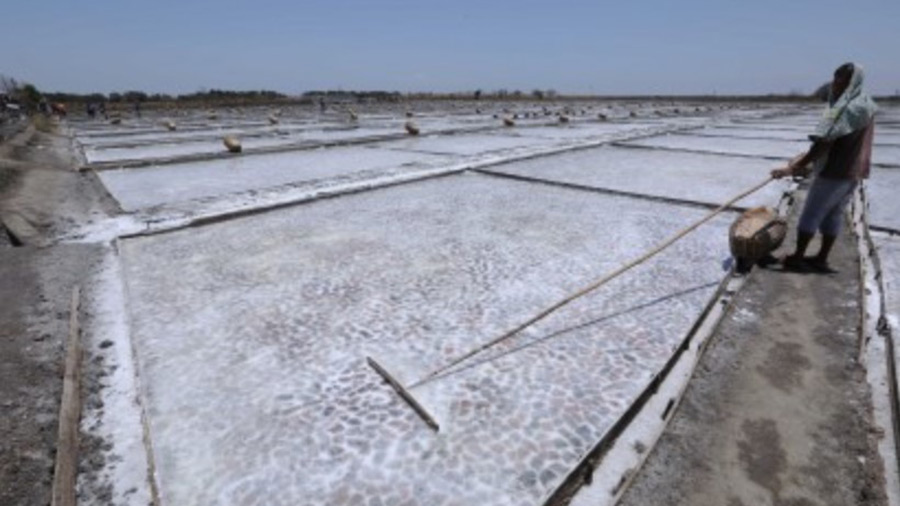President Marcos Jr. has signed into law the Philippine Salt Industry Development Act which aims to strengthen and revitalize the sector and make the country not just self-sufficient of this commodity but an exporter as well.
Republic Act (RA) 11985 signed last March 11 classifies locally produced salt — both unprocessed or processed — as an “aquatic resource product” and exempts it from all taxes, while imported salt is levied nine percent ad valorem.
RA 11985 is a consolidation of Senate Bill 2243 that was passed on Dec. 6, 2023 and House Bill 8278 that was passed on Dec.r 13, 2023. A copy of the signed law was uploaded in the Official Gazette on March 16 and released to the media on March 17.
The 23-page law provides that appropriate technology and research, and adequate financial, production, marketing and other support services will be provided to salt farmers not just to help increase salt production and revitalize the salt industry, but also to expand the number of salt-producing areas in the country.
The development of the industry is also part of the administration’s efforts to promote rural development and increase rural income.
The country is estimated to be importing around 550,000 metric tons MT) of salt every year which constitutes around 93 percent of the country’s salt requirements
The Philippine Association of Salt Industry Networks in previous reports said the country uses up to 683,000 metric tons of salt annually but producers only 60,000 MT from only 2,100 hectares of land,” he said.
Under the law, a five-year Philippine Salt Industry Development Roadmap will be formulated and established to ensure the attainment of the objectives of the law, which are aligned with the objectives and continued implementation of Republic Act No. 8172, or “An Act for Salt Iodization Nationwide (ASIN).
The Department of Agriculture (DA) shall also ensure salt is a priority commodity to be produced locally in areas and regions that would be identified as suitable for salt production.
The Department of Environment and Natural Resources (DENR) and the Bureau of Fisheries and Aquatic Resources (BFAR) are tasked to identify and map the areas suitable for salt production and prioritize the public lands in the provinces of Ilocos Norte, Ilocos Sur, la Union, Pangasinan, Zambales, Bataan, Occidental Mindoro, Oriental Mindoro, Palawan, Marinduque and Quezon.
Misamis Oriental and Antique had initially been identified as priority areas for salt production.
DENR, BFAR and the National Mapping and Resource Information Authority (NAMRIA) are given 60 days from the effectivity of the law, to complete the task of identification and mapping.
The law also provides for the creation of a Salt Council which will formulate the salt roadmap, ensure the unified and integrated implementation of the salt roadmap, and accelerate the modernization and industrialization of the Philippine salt industry, among others.
The secretary of Agriculture will chair the Salt Council, with the secretary Department of Trade and Industry (DTI) serving as the vice-chairperson.
The members include the secretaries of the Department of Environment and Natural Resources, Department of Science and Technology, Department of Health, Department of Tourism, Department of Public Works and Highways, and Department of Labor and Employment.
Also included in the Council are a director from BFAR, executive director of the National Fisheries Research and Development Institute, the chair of the Cooperative Development Authority, and a representative each of the League of Provinces of the Philippines, League of Cities of the Philippines, and League of Municipalities of the Philippines.
The council shall also include a representative from the private sector engaged in salt-production, and three representatives from the salt farmer cooperatives — two representing Luzon and one representing Visayas and Mindanao. BFAR shall choose the representatives of the private sector and the cooperatives.
A Program Management Office shall also be created under BFAR which shall perform the role of a secretariat and oversee the overall implementation and monitoring of the execution of the development plan by concerned agencies and partners.
Funding for the implementation of the law shall be sourced from BFAR.
The law will take effect 15 days after its complete publication in the Official Gazette, or in two newspapers of general circulation.





